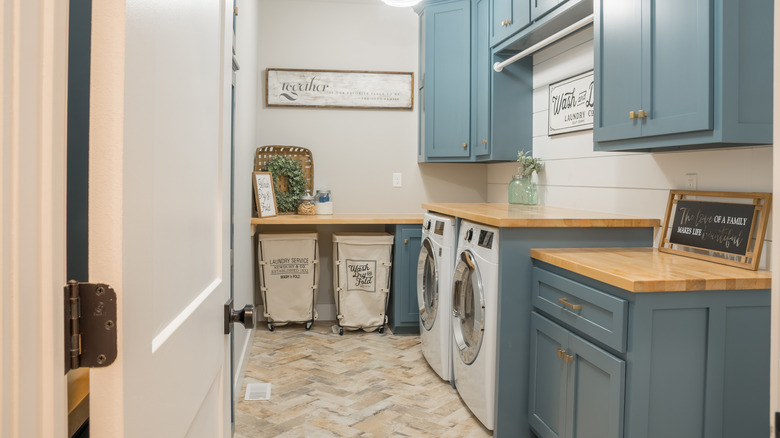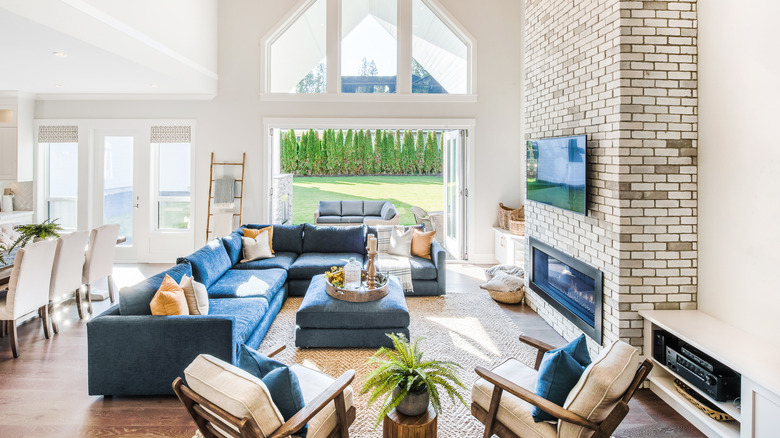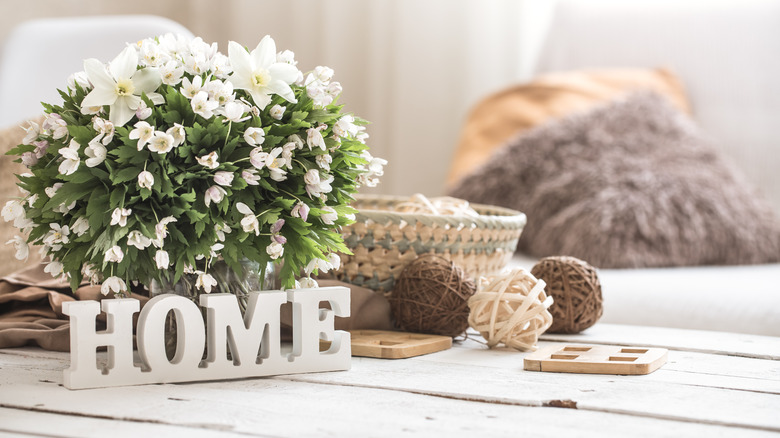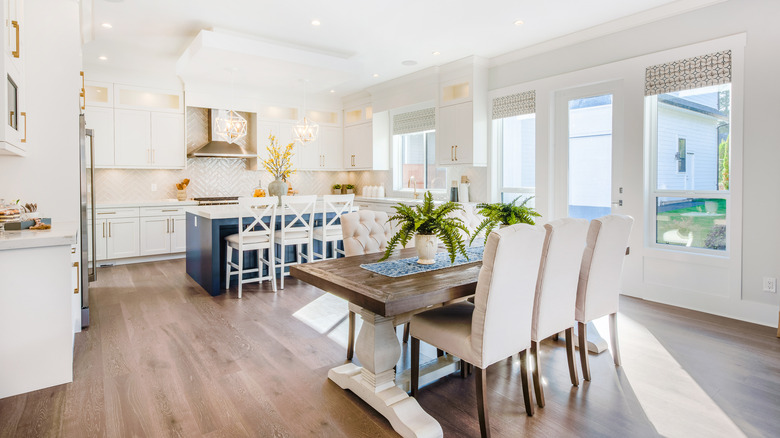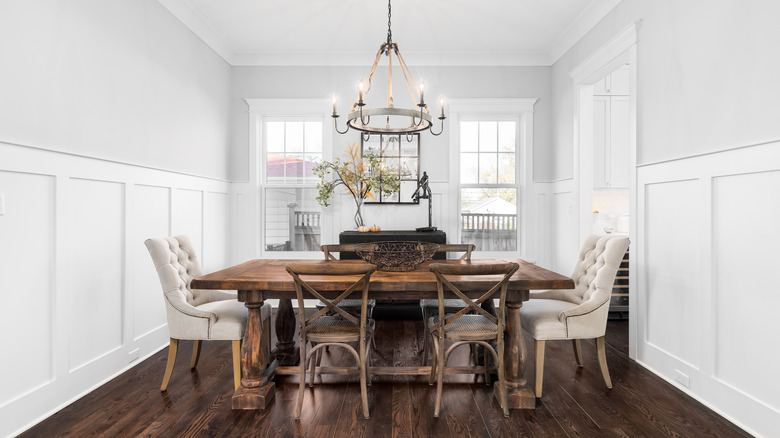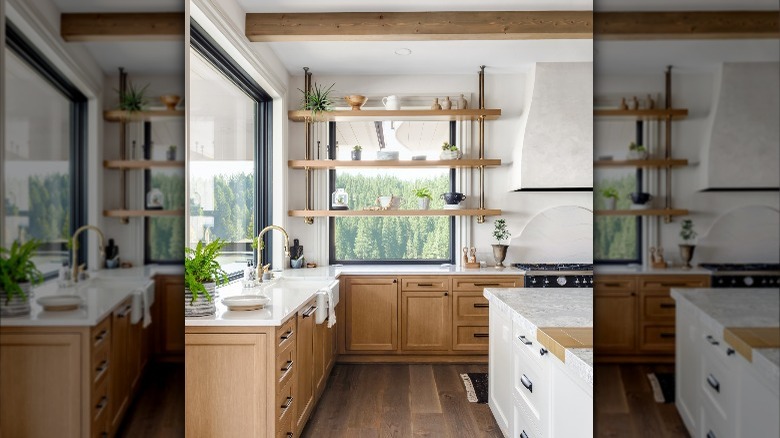5 Of The Biggest Mistakes You're Making When Decorating In Farmhouse Style
As is the case with many styles, it's easy to make mistakes when decorating in the farmhouse aesthetic. Part of the reason for this is that many homeowners purchase excessive items from decoration stores, thinking that a large collection of items will help them achieve the cozy look they desire. Instead, they're left with an impersonal design that's filled with cheesy items that don't fully showcase the beauty of the farmhouse style, as per Grace In My Space.
Perhaps you love professionally designed farmhouse rooms but aren't sure how to achieve this look in your home. Maybe you've tried to create a tasteful space but it's just not looking right. If you're wanting some advice on how to produce a design even Joanna Gaines would approve of, below you'll find five of the biggest and most common mistakes homeowners make when styling their home, as well as some tips on how to avoid these issues.
Keeping it too neutral
While neutral tones are important in the farmhouse design, creating a completely neutral space may be a mistake. This is because, when there's no color at all, a room can appear dull or boring. Additionally, according to Just Organized By Taya, the modern farmhouse style is all about layering with different shades and materials to create a comfortable appearance. When adding color, they suggest sticking to a strict palette, so your space doesn't begin to appear too eclectic. If you're stumped on how to add color to your home, Smith Hönig suggests including colored furniture, vintage rugs, throw pillows and blankets, wall paint, wallpaper, or artwork.
If you're looking for the right shades to include in your space, natural greens and blues are common choices. For an extra warm look, you could use pink or terracotta shades. A delicate appearance could be created with pastel pink or sage green. Benjamin Moore suggests using muted green, dark blue, or bright red shades. Black can also be a great way to create some chic contrast in your home.
Using too many quotes
Another common mistake many farmhouse lovers make is using too many quote signs. The DIY Playbook says that this can make a space appear overwhelming, as it will confuse the viewer about where their main focus should be in the room.
There are a few ways to fix this issue. The first is to limit your word art to one piece per room (with the occasional smaller piece as well, if desired). Additionally, make sure you only use pieces that are personal to you and don't just have generic sayings. My One Hundred Year Old Home says that they replaced many of their farmhouse signs with abstract artwork to create a more modern look. The Modern Rustic Home suggests pairing your word signs with other décor pieces in groups of odd numbers. The most common choice is in groups of three; for instance, you could place two plants on either side of your word art on a shelf.
Creating a cluttered space
Many farmhouse homes can quickly become filled with large furniture pieces, décor items, and decorative accents. The result is sometimes an overly filled and cluttered space, which could give your home a chaotic feeling.
To combat this, The Simply Organized Home suggests choosing furniture with lots of storage space, such as ottomans that open up or side tables with drawers. This will allow you to put away your unsightly items and give your space a more minimalist feel. Additionally, they suggest using closed storage to your advantage and not going overboard with open shelving. They also emphasize the importance of decluttering your items regularly.
Grace In My Space has some additional advice. They say to limit your accent pieces, such as pillows, throws, and blankets. Further, when choosing decorative items, carefully consider if you truly love them or if they just fit your aesthetic, and only purchase those that really bring you joy. When decorating in the farmhouse style, layering will give you a cozy but not cluttered appearance. You can layer artwork, blankets, and decorative accents.
Not using any vintage pieces
According to The Cottage Journal, vintage pieces are an important part of every well-designed space but they're especially important in the farmhouse style. Not using any truly vintage pieces and instead using new pieces that have been manufactured to look distressed is a huge mistake that many homeowners make. According to My One Hundred Year Old Home, faux distressed pieces could make your home appear cheap, and many designers say that these pieces are going out of style.
The Barn On Country Club says to use some shabby chic pieces to bring in a modern farmhouse style. Additionally, mixing old items with new ones will create a well-designed space. They say that the best vintage items are those that have been distressed because they've been so well-loved over years and years. Similarly, Star Furniture says that these pieces embrace their imperfections, as more chips and dings mean more character. When searching for vintage items, focus on large pieces like a dresser or a dining table, which will work to completely transform your home.
Limiting your use of wood
Finally, when decorating in the farmhouse style, you shouldn't try to limit your use of wood. As The Cottage Journal explains, reclaimed or exposed wood is essential to this style, as it works to soften and warm up the appearance of the space. Even using just one large wooden element can make a huge difference, especially if your home is mostly neutral and cool-toned.
Annie & Oak says that butcher block counters and exposed wooden beams are commonly used in farmhouse interiors. While being aesthetically pleasing, these elements will also provide your home with an earthy and rustic look. You could also include wooden barn doors, a staple of many farmhouse designs. Additionally, Apartments Seldom Scene suggests using wood whenever you can, including when choosing your coffee table, nightstands, and bookcases. The most common wood type used in farmhouse homes is pine, as it's typically inexpensive, easy to stain, and simple to work with, per Farmhouse Guide.
